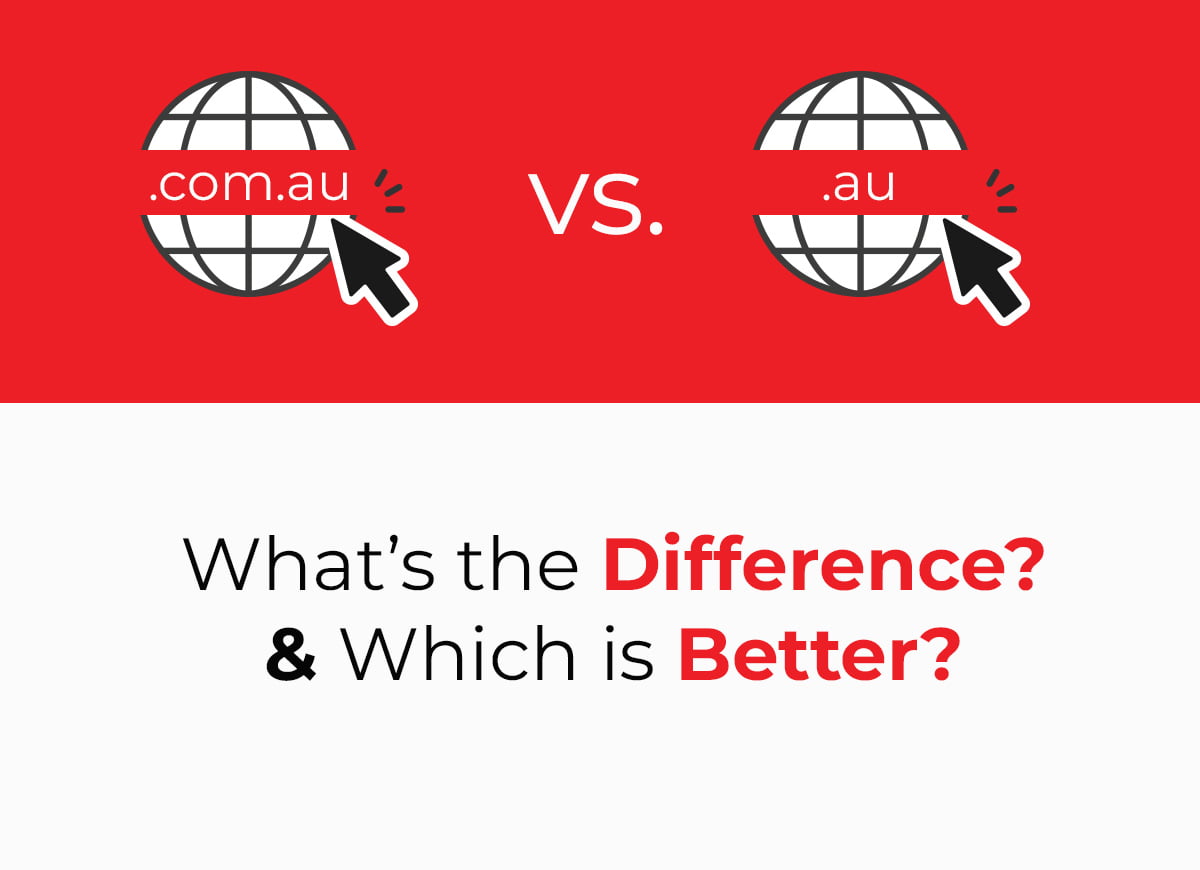Choosing an apt domain name is among the primary and crucial decisions that businesses are required to make. Whether or not you’ll receive a good response on your website has a lot to do with the domain name you choose. The characteristics of how simple and easy a domain name is – might seem trivial at first but goes a long way in determining the success of a website. By success, we mean increased traffic, users making repeat visits, increased page reviews, and so on. Once you choose a relevant domain name, the entire focus shifts to creating an enticing website design. How well it responds falls back on its website design, functionality, and optimisation.
But before that, it is important to choose a domain name and decide what specificities you require. Do you intend to register a country-specific domain? If yes, what options are available in the second-level domains and which ones to go for to fulfil the business purpose?
This blog will offer a detailed guide about .com.au vs .au domain. If you have already been confused between these two, you’d have a clear idea after reading the entire post.
So let’s compare the two country-specific domains and see how they work!
.com.au vs .au
As we know, we have got a huge list of domains to choose from for our websites. Starting from the most reputed .com domain. It is primarily assigned for commercial purposes. Besides this popular domain, there are subsequent alternatives like .co, .org, .edu, etc., that come with their own purpose and intent. And then, there are country-specific domains that run within a particular country, including—.au for Australia, .ca for Canada, .nz for New Zealand, and so on.
Now when we talk about Australia, two prominent domain names that come to mind are .com.au and .au. Businesses that want to create their website to tap the Australian markets are faced with the dilemma of choosing between these two domains and need help finding a reasonable ground of comparison to know which one to choose and on what basis.
So here in this blog post, we’d help you spot differences between these two so that you can reach a sound decision and side with the one that favours you the most! Since both domains, .com.au and .au, end with country code, both perform well in the SEO when it comes to optimising the URL as per the local SEO.
In the view of expert SEO companies, including a country-specific domain name always adds value to SEO.
To know which one stands in favour of your business, let’s start from the basics.
.com.au
.com, as we all know, is a domain created for commercial purposes. And .com.au, as it sounds, is specifically created for the Australian markets. Only it’s a second-level domain that comes with a further extension (.au). If you wish to register this domain, you need to fulfil certain criteria, among which you must obtain ABN (Australian Business Number) or ACN (Australian Company Number) or should have a base in Australia. .com.au has been operating for a while, and nearly 90% of the Australian sites are registered under this domain. This was the most popular country-specific domain existence until .au came into existence.
.au
.au is a simple, shorter and crisp domain. It’s a new second-level domain that, unlike the .com.au domain, doesn’t include any extension to the country domain. Other than providing a professional outlook, it can add to your advantage when it comes to marketing your brand using a smaller, easy-to-remember domain name. Websites that come with easier and catchy names and domains hold an upper hand in the market due to their naming, logo, or simpler web address. Also, it can be a great resort to lure the local crowd signalling your local business identity or base in Australia.
The crisp and short structure it provides to the domain name is unbeatable, and there’s an evident reason why businesses prefer it over .com,au domain. Still, there are many considerations that must be kept in mind before making the final decision.
How to Choose a Domain Name?
Choosing a domain name must come from proper compliance with the auDA’s rules and guidelines. While.au direct has been launched in the recent past, in the year 2022 – to be precise, the right to secure the brand-specific domain name has been reserved for the existing brand owners. It is called the priority allocation process.
Let’s try to understand with the help of an example. If you have an existing domain of abc.com.au, then you’ve been given an advantage or, say, a right to get yourself registered with abc.au right within a period of 6 months. And once the stipulated period is exhausted, the domain names will be made available to regular applicants.
However, it is recommended to secure the .au domain exclusively for your business. It will help you have broader user access.
Which domain suits my business?
Let’s try to understand it case by case. Suppose you already have a website registered under the domain of .com.au; then, you must choose to stick with a particular domain, as shifting to the .au domain can lead to the loss of authority that you have gained from your SEO efforts. But does that mean you cannot own both the domains? Of Course not! In fact, it is widely recommended by expert SEO companies to secure the other domains of your brand name to keep your brand identity intact and protected.
If you are required to register a new website with a county-specific domain, you must choose .au as there are multiple benefits associated with it. First, it is short and crisp and free of any additional extensions. Second, you’ll be offered a wide variety of domain names as it is a newly launched domain and not many name options have been occupied by now.
Can I have multiple domains?
Another question that must come to your mind is: Can you hold multiple domains? And the answer is yes! Let’s understand the question in different parts and try to answer them point by point.
Suppose you already have a .com.au domain registered in the name of your business. One thing you can do is to stick with it. Another way is to buy the .au domain so you can reserve the right to enjoy your brand name with all second-level domains available for purchase.
Also, if you are wondering, it’ll be a hassle to maintain the multiple domains of a website. Know that you can manage it with a single website. You need to have one website to which you can redirect to all the existing domains, and you’ll be able to enjoy the name monopoly of your website. Although it’s not mandatory to hold multiple domains, it would still add to your favour and help keep the business integrity and exclusive rights intact that comes with it.
This way, besides being the only one representing your brand name in the multiple domains, you’ll be entitled to many other benefits. Such as deterring cyber threats and fraudulent attempts misrepresenting your brand name, others using your brand name, broader access for the users, and so on.
Take Away
We hope reading it brought clarity to you and will help you decide which direction to move in. Choosing domain names can be tricky, but not when you know how you are going to benefit from the domains that are available to you.
About the .com.au and .au domains, you know the benefits and challenges that come along with choosing them. So accordingly, you can decide on a domain name for your business website and see how it works for you.
In particular, you can opt for .au if you are looking forward to creating a new website. Or you can buy the au direct domain if you are already floating a website on the.com.au domain. This is to ensure you are not leaving any loose ends when it comes to securing your brand name.
Still, if you need more assistance or guidance in this context, you can consult Make My Website. They have served their clients with exceptional services and are committed to providing every possible support to promote their business online.














